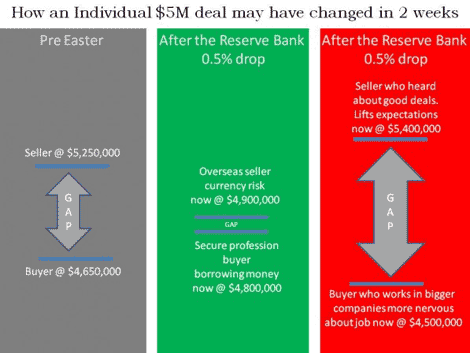Rate cut and currency changes could have mixed results for top-end property

The Reserve Bank‘s interest rate cuts can have mixed results at the top end of the property market.
The Reserve Bank gave us all a bit of a surprise with its recent rate cut of 50 basis points. But the impact of the rate cuts at the top end could be mixed.
The diagram below shows the progress of two identical hypothetical negotiations that started before Easter. Back then the difference between what the sellers wanted and what buyers were prepared to offer was $600,000.

With the interest rate cuts, a couple of results could eventuate – especially at the top end where often there is only one buyer.
On the one hand, a lower interest rate may give the buyer confidence to offer a higher price, as long as he is feeling secure in his job. At the same time, if the seller was say overseas and had an exposure to currency movements, the interest rate change might make the seller nervous.
A large exchange fluctuation can alter the value of an offer more radically than any agent argy-bargy. So a seller at exchange risk may alter her price and help the deal and a buyer who is secure in his job may also help the deal in going a little stronger, as he finds borrowing to be marginally cheaper. With just a $100,000 difference between offer and expectation there may well be a deal done.
Alternatively, the events of the last few weeks may have the opposite effect. The seller may have looked at some of the recent strong sales on the top-end market and have lifted their expectations even higher, thus widening the gap. The buyer, on the other hand, may look at the interest rate cuts as an indicator of a struggling economy, and become more concerned about his future employment prospects, prompting him to reduce his original offer. Now the deal is even further apart, with a difference of $900,000 between offer and expectation.
The point of this hypothetical is to show how complex negotiations can be at this level, and how as a buyer you’ve got to navigate through a number of possible scenarios.
How do you get validation if you want to do more in the way of due diligence than take the selling agent’s word as gospel?
Personal research: At the moment researching the high end without being in the know has a higher degree of difficulty than an Olympic half pike from the high tower – there seems tremendous secrecy surrounding every sale. With secrecy comes its close friend “uninformed speculation“. And when you throw into the mix limited numbers of sales, inexperienced buyers can bake a very different cake when it comes to value.
Valuers: This is fast becoming a profession under siege as margins are cut dramatically by banks. This means cost-cutting internally, which can lead to a lowering of standards. And once habits of careful fact checking are replaced by wham-bam phone calls to those who have vested interests in rubbery figures, all of a sudden we no longer have credible valuations. Which is not to say that there are not some excellent valuers out there for the top end. But you need to question whether you should rely on those who have massive contracts with large developers, or who approach their valuations at 60 kilometres per hour with a Google maps mentality. Sure, they’ll fit in with what the selling agents tell you. And there won’t be any problems with the bank lending you the money. But if the figures you’re given are unreliable, you may have a big problem on your hands when it comes to resale.
Solution: Deal with the people who do the deals. Engage them to act on your behalf and ask them to justify and prove their selling or buying price thoughts. If the deal is big enough get verification though a reputable valuer – not one recommended by a selling agent, and not one who specialises in $400,000 Werribee homes – but a real one. The fee is between $3,000 and $4,000. In this low transaction and therefore weak information market they can be more valuable than a building inspector.
So how do you negotiate in this market?
When validation is not possible and the market is unclear going forward, you really need to be on your game when making decisions – presuming that good decisions are your aim.
So as boring as it sounds, be clear on your goals and whether they fit this market. For instance, buying a home with a short term time horizon and wanting low risk are almost mutually exclusive concepts right now.
Longe- term buying may well meet your emotional and financial goals.
Let’s skip the search strategies and some due diligence and get to pricing.
In this market its about price framing rather than price negotiation – by which I mean that haggling over $100,000 is really not the main game, it’s getting into the correct $1 million segment in the first place that’s the most important.
Mal James is principal of James Buyer Advocates, which advocates on behalf of buyers of property over $1 million. Mal writes weekly auction reports, advice and in-depth market analysis on James' website.